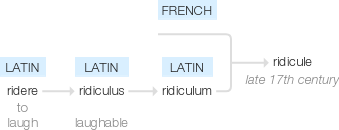Ridicule
late 17th century: from French, or from Latin ridiculum, neuter (used as a noun) of ridiculus ‘laughable’, from ridere ‘to laugh’.
wiktionary
Borrowed from French ridicule, from Latin ridiculus(“laughable, comical, amusing, absurd, ridiculous”), from ridere(“to laugh”).
From French ridicule, probably jocular alteration of réticule.
etymonline
ridicule (v.)
1680s, "make ridiculous" (a sense now obsolete); c. 1700, "treat with contemptuous merriment, make sport of, deride," from ridicule (n.) or else from French ridiculer, from ridicule. Chapman, for a verb, used ridiculize. Related: Ridiculed; ridiculing.
ridicule (n.)
1670s, "absurd thing, object of mockery or contempt;" 1680s, "words or actions meant to invoke ridicule or excite laughter at someone's expense," from French ridicule, noun use of adjective (15c.), or from Latin ridiculum "laughing matter, a joke, a jest," noun use of neuter of ridiculus "laughable, funny, absurd," from ridere "to laugh" (see risible).
"He who brings ridicule to bear against truth, finds in his hand a blade without a hilt." [Walter Savage Landor, "Imaginary Conversations"]
